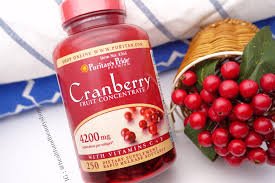DRUG OF THE WEEK:
CRANBERRY
First I'll like to present a case study...which some of us might have experienced before in practice😬
A 27 year old female patient comes to your pharmacy and complains of symptoms of urinary tract infection (UTI) that has persisted for a long time. She confirms she heard the word UTI during a lab test. So you bring out all the antibiotics you know that works for UTIs and she says she has used each and everyone one of them even in combinations but it keeps coming back. What is the diagnosis and what can you give to improve her condition?
BACK TO CRANBERRY
Cranberry (Vaccinium spp) is a type of evergreen shrub that grows in wet areas. It is native to the US.
It was first used as food, made into cranberry juice, cranberry juice cocktail jelly and sauce.
Cranberry is most commonly used for the prevention and treatment of UTIs.
HOW DOES IT WORK?
Cranberry was thought to work for UTIs by making the urine acidic thus making bacterial growth unfavourable. However current research shows that some chemicals in cranberry such as salicylic acid prevents the bacteria from sticking to the cells that lines the wall of the urinary tract.
It may however not have the ability to release bacteria that was already stuck to the cells. This explains why cranberry is effective for preventing UTI but may not be effective in treating them.
COMMON SIDE EFFECTS
Cranberry is regarded as safe to a very large extent but there are however limits.
Common side effects includes mild stomach upset and diarrhoea, this occurs in ppl which drink too much of the juice and may not be obtainable with the supplement we have in stock
.
Drinking more than 1litre of the juice daily may cause kidney stones. This also isn't applicable to the one we have in stock
Cranberry contains significant amounts of salicylic acid and may not be friendly with ppl with allergy to aspirin if taken in large quantities.
Caution should be taking in people with atropic gastritis as cranberry would affect how the body absorbs vitamin B12...this is not a common Nigerian condition however.
INTERACTIONS WITH OTHER DRUGS
The most common interaction is with warfarin. It prolongs the time of warfarin elimination and may cause increased bleeding so caution is adviced
Other drugs includes NSAIDs esp celebrex
Diazepam
Amitryptilline
Fluvastatin
Glipizide
ARBs
Phenytoin
Torsemide
Tolbutamide
As we see...most of the drugs cranberry interacts with are once daily drugs.. so the administration of both drugs could be spaced by 12 hours. This is however to allay fear as a 4 hour space is still very safe.
Now back to my case study....this is something I've experience before...2nd hand though.
The condition this lady is suffering from is Recurrent UTIs
Recurrent UTI are symptomatic UTIs that follow resolution after and earlier episode, usually after appropriate treatment.
So you may be administering the appropriate antibiotics but the infecting keeps coming back
You can't give antibiotics forever. ...you know the implications of this🤔
TREATMENT
You could start a new regimen of antibiotics altogether and include our cranberry in your prescription and I assure you even if the UTI is spiritual, the patient will give a positive testimony.
I'll come to the end of my topic. I hope you found it insightful.
I await your comments and questions.
#That_Pharmacist_that_cares
Hi! I am a robot. I just upvoted you! I found similar content that readers might be interested in:
https://www.medicinenet.com/cranberry/supplements-vitamins.htm
great.....have checked it out